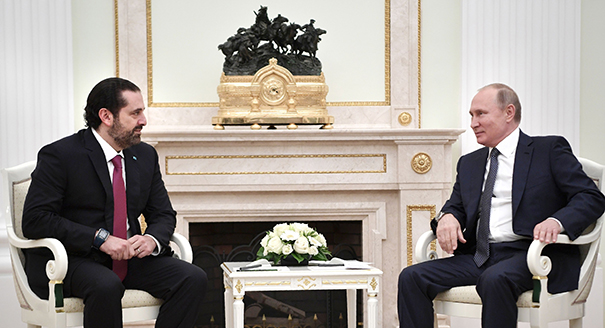Russia has continued in its attempts to establish durable political, economic, and cultural influence in Lebanon. In many regards 2018 was an important year for Russia’s presence in the country. In the first weeks of 2019, Moscow continued to display a similar interest.
Last week, despite political deadlock and mounting economic woes in Beirut, Lebanon’s Ministry of Energy and Water Resources signed an operations and service contract with the Russian state-owned oil company Rosneft to rehabilitate, expand, and operate oil storage facilities in the port city of Tripoli. The company’s CEO, Igor Sechin, hoped for “the further expansion of cooperation with Lebanon and for the implementation of other potential projects in the oil and gas sector in this country.”
The move was significant, as Rosneft is the second Russian oil company to enter Lebanon’s nascent oil and gas sector. Last year Novatek, as part of a consortium with Italy’s Eni and France’s Total, signed an offshore oil and gas exploration and production agreement with the government, the first of its kind. Russia aims to play a leading role in the eastern Mediterranean gas sector, specifically in Lebanon and Syria.
The chronology of Russian moves in 2018 is useful to forecast future steps by Moscow. Russian policy reveals persistence. In February, Russian Prime Minister Dmitri Medvedev signed a Lebanese-Russian military agreement, and managed to place it on the cabinet’s agenda in Beirut. Under U.S. pressure, the Lebanese government indefinitely postponed its decision on the matter. The United States remains committed to its assistance program to the Lebanese Army. In fact, Washington’s budget for this has increased. Lebanon’s military continues to receive U.S. training and equipment at no cost to overstretched Lebanese finances. On the other hand, the agreement with Russia entails a $1 billion credit line, to be paid within a decade.
Technically, financially, and politically, the deal with Russia remains problematic for a number of reasons. U.S. pressure, the negative fallout such an agreement would have on relations with Europe, and the Lebanese military’s dependency on U.S. equipment all work against it. Yet this has not deterred Russia. Last November, Lebanon struggled to walk a fine line on a Russian offer to provide the Lebanese Army with ammunition for free, one that would not alienate Russia or the Western countries. To avoid embarrassment, the caretaker prime minister, Saad al-Hariri, transferred the ammunition to the Internal Security Forces. Russia continues to test the Lebanese waters for opportunities.
On the soft power front, new cultural centers were opened in Lebanon throughout last year, raising the total number to ten. These cultural centers are mostly active and well received among the local population, as they enrich the art and performance scenes across the country, offering affordable music, dance, and language classes. While there seems little need to open more cultural centers, given the country’s small size, there are plans to open at least one new center in southern Lebanon. Lebanese businessmen with ties to Russia have often funded these initiatives, so they come at no cost to the Russian state. However, the centers are not solely cultural as they host a wide range of events, including political events. Last month, for instance, a group of leftist figures, including some considered friends of Russia, launched a new political opposition umbrella group at the Russian Cultural Center in Beirut, Lebanon’s largest.
Also last year, Lebanese officials set a new record for visits to Moscow, with officials flocking to the Russian capital every month. Unlike most of the regional and international powers that are active in Lebanon, Russia enjoys cordial relations with all parties, even those that are friendly with the West, such as Hariri. In November 2018, Russian President Vladimir Putin awarded the Order of Friendship, the Russian Federation’s prestigious state decoration, to George Sha‘ban, Hariri’s advisor on Russian affairs.
These diverse relationships were put to use early this month, as an Arab media outlet reported that Russia had intervened with Lebanon to secure the release of Hannibal Qaddafi, a son of the late Libyan leader Mu‘ammar al-Qaddafi. Hannibal is being held in a Lebanese prison for allegedly concealing details about the 1978 disappearance in Libya of Musa al-Sadr, the founder of the Shi‘a Amal movement. The son of a Lebanese cleric who disappeared with Sadr on that trip had organized the abduction of Qaddafi’s son in Damascus in 2015.
The effort to release Hannibal, upon his family’s request, stems from Moscow’s nascent role in Libyan affairs, and specifically its attempts to find a political function for his older brother, Seif al-Islam Qaddafi, in Libya’s future. A month before the Russian appeal, envoys representing Seif al-Islam had visited Moscow to discuss Hannibal’s release, particularly as the three-year sentence for concealing information has been exceeded.
However, Musa al-Sadr’s case remains highly significant for Amal. The release might require Libyan concessions, or further cooperation, in the Sadr investigation. Given the sensitivity of the issue, particularly for the Lebanese parliament speaker, Nabih Berri, who leads the Amal movement, the Russian intercession will constitute a test of the extent of Moscow’s influence in Lebanon.
However, the perception of Russian influence continues to grow among Lebanese politicians and the public. Walid Joumblatt, the Druze leader, made a striking analogy in describing this influence. He recently tweeted that the deal with Rosneft was reminiscent of the colonial powers’ struggle for oil in the region a century ago. Joumblatt wrote that in the author James Barr’s A Line in the Sand, which addresses the Sykes-Picot agreement agreed by Britain, France, and Russia in 1916, the British and French had agreed to “oil lines” between Kirkuk and Tripoli and Kirkuk and Haifa. “With Rosneft in Tripoli, and tomorrow in Banias and Basra, Zarif-Lavrov [the Iranian and Russian foreign ministers] will be the headline of the new Middle East between the Russians and Persians.”
If nothing else, Joumblatt’s remarks served to underline how many Lebanese regard Russian influence in their country and the region as being dramatically on the rise.






